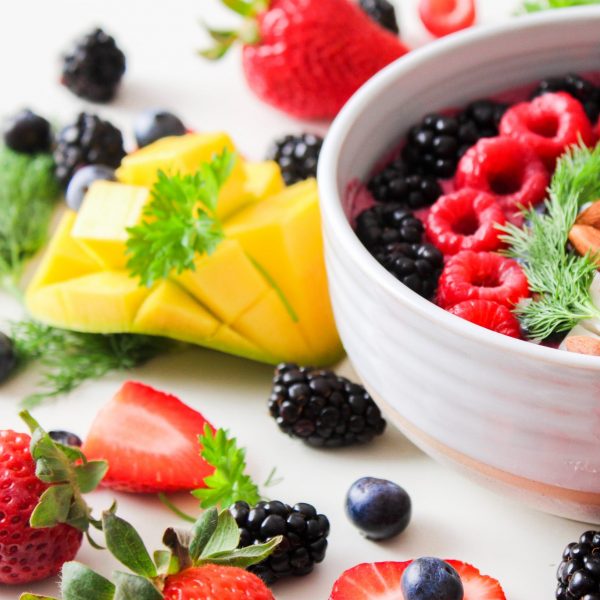I’ve talked about healthy digestion and its importance for fertility on this site before. Yet, I haven’t talked much about how improvements in digestive health help women with PCOS (polycystic ovary syndrome) specifically. From a natural perspective, dietary therapies are imperative for any natural fertility program for PCOS. Women with PCOS need support for healthy hormone metabolism, and the right dietary choices are a fantastic place to get started!
PCOS is about a body out of balance, especially when it comes to hormones. Women with PCOS may suffer from:
- excess estrogen, estrogen dominance (imbalance between the estrogen to progesterone ratio)
- chronically low progesterone
- high circulating androgens or high luteinizing hormone (LH) levels
- insulin resistance
- thyroid health concerns
It’s clearly a complicated problem. While we see similarities in women with PCOS, how PCOS affects your hormone balance is unique to you.
Achieving Hormone Balance Through Healthy Digestion
When addressing PCOS, start by promoting healthy digestion and normal hormone metabolism. This can help anyone with this challenge! Here are pillars for digestive health for your PCOS program:
1. High-fiber foods: Fiber helps stabilize insulin levels by slowing the release of glucose into the bloodstream. Eating more fiber can improve androgen balance, as high androgen and testosterone levels can be tied to high blood sugar. Further, fiber helps to metabolize excess estrogen, keeps you feeling full longer and flushes fertility-damaging toxins out of the body.
Make sure to include at least two of the following every day: dark leafy greens like kale, spinach or collard greens, beans (lima and black), split peas, lentils, artichokes, apples with the skin on, raspberries (organic only), leeks, unprocessed whole grains. Learn more: Fertility Health Benefits of Eating More Fiber.
2. Brassica family vegetables: Vegetables in the brassica family are rich in compounds like sulforaphane and indole 3 carbinol (I3C; which is converted into DIM by the digestive system), which help the body to break down and eliminate excess estrogen.
Enjoy brassica foods like broccoli, cauliflower, rutabaga, Brussels sprouts, and cabbage regularly on your program. Note: It’s a good idea to steam them first if you have low thyroid as eaten raw they may suppress thyroid activity. Also, avoid frozen Brassicas, which research suggests have lower levels of these healing compounds (Journal of Food Science).
3. DIM (diindolylmethane): While Brassica foods supply DIM, it’s extremely difficult to get therapeutic amounts from these foods alone, even by having a few servings daily. Definitely keep eating these foods, but consider learning how the supplement DIM can help your program. Learn more: You Can Reduce Excess Estrogen with Supplement DIM.
4. Prebiotic and probiotic foods: These foods keep elimination strong and the gut balanced with healthy “friendly flora.” Without the right flora, digestive health is compromised and fertility problems like PCOS may be worsened.
Consume prebiotic foods like garlic, onions, and jicama, which act as a food source for your healthy gut flora. Add probiotic foods like organic yogurt, kefir, or kombucha to encourage production of healthy gut flora. These diet changes alone can make a big difference in your fertility program. Learn more: Fertility Health Tips: Probiotics and Prebiotics.
5. The herb Gymnema: Most women experience food cravings on their fertility programs, but women with PCOS may be particularly hit as glucose imbalance can trigger food cravings. Sometimes called the “sugar destroyer,” Gymnema (Gymnema sylvestre) can ease sugar cravings by blocking the taste of sweet foods. 2007 research published in the Journal of Clinical and Biochemical Nutrition shows Gymnema encourages normal insulin production and helps to lower blood sugar levels, good news for women with PCOS who have insulin resistance.
Digest Well!
Dealing with PCOS may seem like an insurmountable task, but there is so much you can do to help your body rebalance every day with simple dietary choices. You can take big steps to balance your hormones every time you pick up your fork. While no diet is perfect, making incremental changes in your PCOS fertility program can guide you back to better hormone balance, and improved natural fertility.
- D’Aquila, Rob, D.C. (2012, April). Blood Sugar Imbalances Can Alter Estrogen and Testosterone Levels. Retrieved from: https://robdaquila.com/2012/04/23/blood-sugar-imbalances-can-alter-estrogen-and-testosterone-levels/
- Kanetkar, P et al. (2007, Sept.). Gymnema Sylvestre: A Memoir. Journal of Clinical Biochemical Nutrition; 41(2): 77–81. Retrieved from: https://www.ncbi.nlm.nih.gov/pmc/articles/PMC2170951/
- Michnovicz, J. et al (1990, June). Induction of Estradiol Metabolism by Dietary Indole-3-carbinol in Humans. JNCI: Journal of the National Cancer Institute, Volume 82, Issue 11, Pages 947–949, https://doi.org/10.1093/jnci/82.11.947. Retrieved from: https://academic.oup.com/jnci/article-abstract/82/11/947/905664
- Dosz, EB. et al. (2013, Sept.). Modifying the processing and handling of frozen broccoli for increased sulforaphane formation. Journal of Food Science; 78(9):H1459-63. doi: 10.1111/1750-3841.12221. Epub 2013 Aug 5. Retrieved from: https://www.ncbi.nlm.nih.gov/pubmed/23915112





